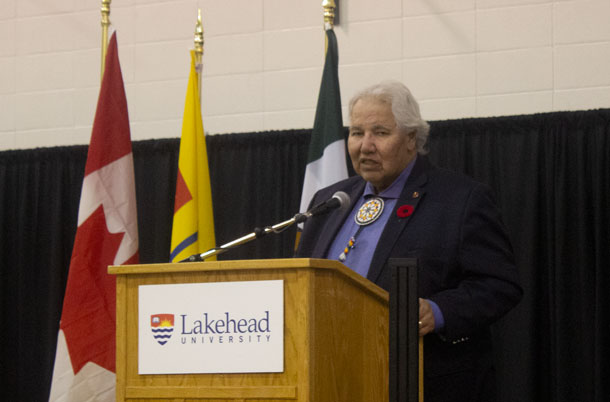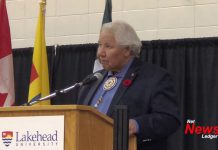
THUNDER BAY – Senator Murray Sinclair has released his report on the Thunder Bay Police Services Board. The Senator’s report has resulted in the issuance of an order by the Ontario Civilian Police Commission (“OCPC”), which has suspended the Thunder Bay Police Services Board effective December 14, 2018, and put in place and administrator.
From his findings, Senator Sinclair says that the board failed to do its tasks properly and that the board needed to be suspended. Senator Sinclair in his report recommends that no members of the previous board – this includes Don Smith, who was vice chair of the new board, but resigned this morning, along with former chair Jackie Dojack, Councillor Brian McKinnon, and previous Thunder Bay City Councillor Joe Virdiramo be allowed on the new board.
Senator Sinclair, however, does exempt Celina Reitberger who was selected as chair of the board earlier this month.
Thunder Bay Mayor Bill Mauro is not offering comment until Monday on this report.
Senator Sinclair reports, “The Board did not demonstrate meaningful engagement in its own strategic or operational planning, relying for the most part on input from the Chief of Police and staff. There are no Board-developed, Board-driven planning policies or formal instruments to support long-term strategic or annual operational planning in place.”
Critics of the Police Services Board have in the past expressed frustration that the board appeared more as a support mechanism for the Thunder Bay Chief of Police and the Thunder Bay Police Service than as the civilian oversight.
The report states, “The Indigenous population of Thunder Bay experiences racism, both overt and systemic, on a daily basis. High-profile cases of murder and violence are only the tip of the iceberg; every Indigenous interviewee had a personal story, ranging from inferior service, verbal insults, and racial profiling to physical assaults, threats of violence, and, in many cases, the death by violence of friends or family members. This general climate of racism was most powerfully described by those who experience it daily; it was also reflected in an analysis of media coverage, statistics on rates of violent and race-based crime and prior studies on these issues.
“As a result, the Indigenous community has lost its confidence in the ability and, in many cases, the commitment of the TBPS to protect them. Interviews and past inquiries reflect a relationship between the Indigenous community and police characterized by suspicion and distrust. Several factors have contributed to this.
- A perception that police will minimize, dismiss, or fail to investigate complaints of violence against Indigenous people with diligence, particularly if intoxicants are involved;
- Poor communication with Indigenous victims of crime and their families by the TBPS;
- A fear that formal complaints by Indigenous individuals directed to the TBPS will
result in repercussions against the complainant; and
- A general failure by TBPS to address recurring categories of crime against Indigenous people in a comprehensive and systemic way.
Negative perceptions of the TBPS by the Indigenous community have been exacerbated over the years by incidents in which unmistakable racism is displayed by individuals within the TBPS. These have ranged from well-documented public mockery and the dissemination of racist stereotypes, to use of excessive force against and humiliation of Indigenous individuals, to disturbing deaths in custody.
- Negative perceptions of the TBPS by the Indigenous community have been exacerbated over the years by incidents in which unmistakable racism is displayed by individuals within the TBPS. These have ranged from well-documented public mockery and the dissemination of racist stereotypes, to use of excessive force against and humiliation of Indigenous individuals, to disturbing deaths in custody.
Apart from its contribution to the climate of fear and suspicion, a further consequence of this distrust is a strong reluctance on the part of Indigenous victims or witnesses to report crimes, or to avail themselves of the police protection that non-Indigenous people take for granted.
In a community with a high level of violence directed against a specific segment of the population, it is reasonable to expect that special efforts would be made to ensure the safety and security of that population, and to put resources, plans and policies in place to protect them. Several such initiatives have been taken in the past, and some provided evidence of a measure of success. However, the climate of mistrust persists. This suggests that the failure of the TBPS to adequately protect the Indigenous community goes beyond actions and attitudes displayed by a few racist “bad apples” on the TBPS; it is the manifestation of a deeper and more systemic problem.
In examining the policy and planning framework that gives shape to policing in the Thunder Bay, a number of systemic issues were noted:
- There are no formal channels for input by Indigenous people or their organizations into the planning and policy development functions that shape policing;
- Indigenous people are under-represented on the TBPS, both in direct enforcement and in administrative and management positions, and there is no formal plan or policy in place to address that imbalance;
- There are no mandatory training or orientation programs in place that speak to the obvious and critical need for cultural awareness training to familiarize police with the history, culture, and issues of the Indigenous community and
- Programs intended to foster rapport with communities and organizations are funded year to year, without long-term commitment of resources.
These problems can be traced back to an absence of leadership from the Board. Under the authority of the PSA, police service boards are mandated to provide civilian oversight and to develop policies and plans reflecting the entire community’s best interests. While no board has a mandate to engage in operational matters, it is clearly the responsibility of the TBPSB to identify critical issues and trends and to address them through direction, proactive policy development, and planning.
A review of the degree to which the Board exercised its mandated planning and policy functions indicated the following:
- The Board did not demonstrate meaningful engagement in its own strategic or operational planning, relying for the most part on input from the Chief of Police and staff. There are no Board-developed, Board-driven planning policies or formal instruments to support long-term strategic or annual operational planning in place.
- The Board did not demonstrate meaningful engagement in the development of governance and oversight policies. There is a heavy reliance on standard templates developed by MCSCS , and a lack of Board-level policies developed to address the obvious and critical needs relating to the policing to protect the Indigenous community. There is no schedule or procedure for initiating reviews of existing policies or for developing new policies in response to emerging needs.
- The Board has not shown leadership in proactive, committed outreach to key Indigenous community organizations, other Indigenous communities or organizations in the region, or Indigenous policing agencies active in Northern Ontario.
- The Board has made no apparent effort to make its policies, plans and activities visible and transparent to the public at large or to the First Nation community.
The Board is directed under the PSA to show leadership to ensure success of the service they oversee – as defined in the law as “adequate and effective policing” – and address this duty through the planning and policy tools available to them. The Board has failed to do so.
vii
The Key Issue
The issues identified with Thunder Bay policing through this Investigation are not the result of behaviours by individual racists, which could be addressed through disciplinary, staffing and training measures. Nor do they arise from the absence of planning and policy development by the Board, which would simply require that policy gaps be filled. They are indicative of a broader, deeper and more systemic level of discrimination in which an unacceptable status quo is viewed as the normal state of affairs, maintained and perpetuated by the structure and operations of organizations and agencies mandated to oversee them. Despite the goodwill and best intentions of individual members of the TBPS and of the Board, dealing with the symptoms of systemic racism will do little to address the fundamental challenge.
The Board has failed to recognize and address the clear and indisputable pattern of violence and systemic racism against Indigenous people in Thunder Bay. Moreover, the Board’s failure to act on these issues in the face of overwhelming documentary and media exposure is indicative of willful blindness.
The results of this failure are clear: 1) the absence of plans and policies to address the crisis in violent crime; 2) an oversight body disengaged from its basic functions of planning, policy development and community engagement; and 3) a major municipal institution lacking many of the basic instruments of good governance and oversight.
Recommendations
Given the long standing and troubling circumstances in Thunder Bay and the Board’s dismissive attitudes towards taking positive steps to address them, the Investigation determined that bold measures are required. Police services boards need to be cognizant and capable of carrying out all of their statutory responsibilities. The Board has demonstrably shown that it cannot.
It is therefore recommended that the OCPC exercise its authority under sections 23(1) and 24 (1) of the PSA to appoint an Administrator for a period of time on an emergency basis. As outlined in Part IV of this Report, the Administrator will temporarily exercise all of the powers of the Board while the majority of the Board is reconstituted in the interim period. The Administrator will carry out all of the functions and responsibilities of the Board until new members, along with Ms. Reitberger, are appointed and have received appropriate and relevant training. The Administrator shall continue to carry out all Board responsibilities and functions including the creation of an appropriate policy framework, as recommended elsewhere in this Report. As soon as the newly appointed Board members successfully complete such training, they can assume the powers of Board members. At that time, the Administrator will remain in an advisory capacity until the end of his or her term. Further, the Administrator will work with MCSCS and the City to ensure that an appropriate level of administrative support will be made available to the Administrator and the Board. The details of the recommended powers and duties of the Administrator are set out in greater detail in Part IV of this Report.
This Report sets out 32 additional recommendations with respect to specific functions of the Board and MCSCS to address the systemic discrimination that exists in policing of Indigenous peoples in Thunder Bay.
viii
Regarding Board Governance Policy
To optimize police governance in Thunder Bay and reduce real or perceived conflicts of interest, it is crucial that the roles of the various bodies involved in policing, such as the Board, Secretary to the Board, TBPS and the City of Thunder Bay, be clearly understood and articulated. This Report recommends that the Board develop a policy regarding relations between the Board and the Chief that clearly delegates operational responsibility to the Chief, but also outlines the Chief’s duties at a high level to include:
- The duty to manage the TBPS effectively and efficiently;
- The duty to implement the policy direction of the Board;
- The duty to ensure a service that reflects the community it serves;
- The duty to provide information to the Board on the TBPS’ performance; its compliance with policies, community relations, developing trends or significant incidents that would affect plans or changes to police services; and annual training and reports on performance in delivering services free of bias, racism, discrimination and harassment; and
- The duty to brief the Board on serious incidents that can affect the community, either past or anticipated.
It is further recommended that the Board undertake the development of a Board Policy Manual to address governance and other matters that are general to all police forces, as well as those that are unique to the circumstances of the Thunder Bay Police Service. All policies of the Board whose publication would not jeopardize public safety should be made accessible.
The Report also recommends the creation of a Governance Committee to review and propose revisions where necessary to all existing policies, specifically including policies affecting Indigenous peoples such as the Missing Person Policy, and to oversee the development and regular maintenance of Board policies.
Regarding Board Planning
The Board’s existing planning process for developing its statutorily-required business plan is not consistent or thorough. It is recommended that the Board develop policies on Business Planning, and on Trend Analysis and Risk Management.
Regarding Recruitment, Retention and Promotion
The TBPS is not representative of the community it serves. It is incumbent upon the Board to direct the Chief to submit, for its approval, a multi-year plan for the diversification of the TBPS, specifically aimed at increasing the number of Indigenous officers and civilian members of the TBPS. It is further recommended that the Board develop, in conjunction with the Chief, a plan to build partnerships with First Nations, educational facilities and others to encourage Indigenous recruitment into the TBPS.
Regarding Oversight of the Chief and Deputy Chief
One of the key roles of the Board is to oversee the performance of the Chief of Police and to ensure that he or she is operationalizing the Board policy directives. It is recommended that the
ix
Board adopt a policy on Relations with the Chief that specifies the Chief’s responsibility to report to the Board on operational matters of concern to the Board, including:
- The TBPS service’s performance, and specifically the delivery of services free of bias, racism, discrimination and harassment;
- TBPS compliance with policies;
- The state of community relations;
- Developing trends or significant incidents that would affect plans or changes to police services;
- Implementation of operational and training plans; and
- Board input or decisions required.
Regarding Communication and Transparency
The Board currently has an extremely limited online presence, linked to the TBPS. The public thus has little awareness of the Board’s distinct role, their mandate, their activities or their priorities. This lack of openness and transparency contributes to the distance between the Board and the community it serves.
It is recommended that the Board establish an independent internet presence and provide meaningful information on Board activities such as the budget, performance reports, annual outreach and consultation plans, meeting notices, agendas and minutes, and other information to promote greater public awareness and understanding of the Board.
It is also recommended that the Board develop a policy and protocol for representation of the Board, crisis communication, Board confidentiality, and other internal and external communication needs.
Regarding Relationships with Indigenous Groups
The Board’s relationship with Indigenous groups is far from optimal, and this contributes to the crisis in Indigenous policing in Thunder Bay. While some of the issues shaping that relationship run deep and require remedial action in Board membership, a more solid policy foundation can also support improved linkages over the long term. It is therefore recommended that the Board establish a policy to define and strengthen both the Board’s and the TBPS’ link with First Nations communities, people, governments, organizations and service providers, setting out the Board’s goals, objectives, strategies, communication and consultation protocols, and other measures to facilitate more effective long-term relationships. Establishing such a policy will create a framework for ongoing partnership building and planning; ensure the Board is held to account; and provide an explicit opportunity for each Board member and Indigenous group to make or renew a clear commitment to relationship building. A starting point could be establishing formal agreements with First Nations governance bodies to share information, raise cultural awareness, and collaborate in the development of formal Terms of Reference for the Aboriginal Liaison Unit of the TBPS.
Regarding Board and Police Training
Comprehensive, structured orientation and training are required by any police services board. In In Thunder Bay, the usual suite of board governance content must be augmented to include
x
specific training on the Indigenous people of the region to familiarize members with the historical, social and cultural context that shapes policing in the city.
The Board must also be properly trained to govern the TBPS. To this end, it is recommended that the Board, in co-operation with Ontario Association of Police Services Boards and funded by the Province, develop a compulsory and standard orientation package for new Board members that addresses the critical skills and knowledge areas detailed in Part IV of this report. To lend force to this approach, it is recommended that newly-appointed Board members not be mandated to vote until they have completed this training, including the proposed cultural awareness sessions.
Regarding Support to Police Boards from the MCSCS
The MCSCS has a significant obligation to ensure that adequate and effective police services are provided in Thunder Bay. It is therefore recommended that the MCSCS create a Police Board Governance Standard which would mandate the roles and define the governance tools required of each police service board; create a New Board Member Orientation Standard requiring that all new board members receive training before participating in board meetings as voting members; and develop a Performance Evaluation Protocol to provide boards and the MCSCS with tools to assess board performance.
It is also recommended that the MCSCS designate the following as crimes for which the TBPS Chief of Police must develop and maintain procedures and processes for criminal and general investigations:
- Criminal Organization;
- Human Trafficking;
- Missing and Murdered Indigenous Women and Girls; and
- Hate Crimes and Violence against Indigenous Peoples.
Finally, it is recommended that the MCSCS create, or make more accessible, the trend analysis that the MCSCS is required to undertake under the PSA, and ensure that such analysis emphasizes marginalized communities, most notably First Nations.
TBPSB Investigation Final R… by on Scribd





